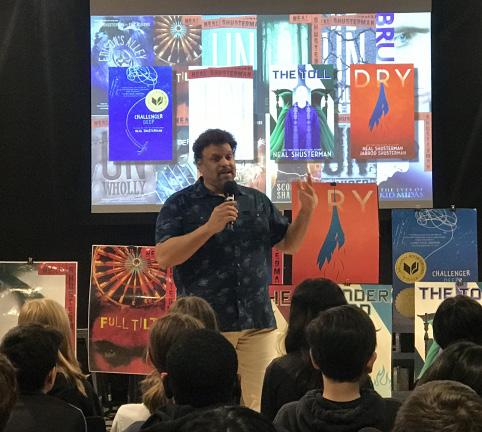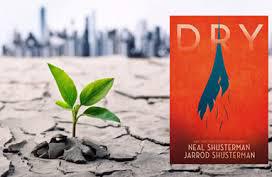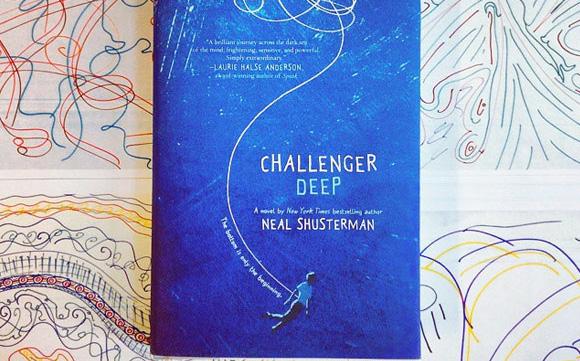
5 minute read
Interview with Neal Shusterman
By Renee Cai
An introduction by Mya Cahana:
Advertisement
Neal Shusterman grew up in Brooklyn, New York, where he began writing at an early age. At age 16, Mr. Shusterman and his family moved to Mexico City. After spending his junior and senior years of high school at the American School of Mexico City, he went to UC Irvine. Within a year of graduating, he had his first book deal and was hired to write a movie script. He’s written the Scythe series, which happens to be my personal favorite, Dry, which he wrote with his son, and many other books and series. I have only read the books I have previously mentioned, but I can’t wait to read more. I loved reading The Toll, his newest novel, and the final book in the Scythe trilogy. I’m not the biggest fan of dystopias, but when I read Scythe, I instantly loved it. I found the plot so interesting, and even though it took place in a fictional world, the characters still felt relatable. Mr. Shusterman has received many notable awards, such as the Boston Globe-Horn Book Award, the California Young Reader Medal and most recently, the National Book Award for Young People’s Literature.
Q: “How did you become a writer?”
A: “I was encouraged by teachers along the way. I was always interested in creative things, whether it be writing or songwriting or acting or art. But as time went on, writing emerged as something I was most passionate about.”
Q: “What are some challenges you face as a writer? How do you overcome these challenges?”
A: “One of the biggest challenges is coming up with a story worth telling. There’s lots of stories out there, lots of stories I could write. Finding the ones that really feel like they will make a difference in the world is tough.”
Q: “How do you come up with your story ideas?”
A: “There really isn’t a process, the stories will come together over time. It’s very rare that I have an idea that just comes to me as a full-fledged idea. Usually, something happens in the world and I want to tell a story about it but I just don’t know how. And then something else happens or I just read something that connects with it -- then I say, “oh, that’s a way I can connect the story,” and then I realize how I can connect it with a character. Then the story begins to build. It’s more of an organic process.”
Q: “Do you have a specific audience in mind when you write?”
A: “Everybody. I want everybody to read my books. Not just teenagers, not just adults. I want them to be read and appreciated by people of all ages, across all cultures.”
Q: “Has an experience in your life changed the way you write? Or even influenced some themes you incorporate in your writing? Does your personal life inform your writing at all?”
A: “My personal life does inform my writing, and I think that you can’t help to inform your writing through the things that you’ve experienced. If you’ve had life changing experiences, they almost always make way into the things you write about, either directly or indirectly.”
Q: Do you have a role model or someone you look up to?”
A: “There’s a lot of authors whose careers I admire. Everyone from Kurt Vonnegut to Stephen King, to Michael Crichton. What I like about Michael Crichton is that he started as a doctor, and then went on to be a writer. He wrote all different kinds of things. He directed. I’m always impressed by people who did a lot of different things.” Q: “What inspired you to write Scythe?”
A: “I wanted to take a look at what happens when we get the things we want in the world. Rather than dystopian, rather than a story that happens when the world went wrong. I wanted to see what the consequences are by actually getting the things we want. And so Scythe is a look at the world when we’ve achieved all the things we said we wanted to achieve.” Most of my books are based on questions that I’m asking that I don’t have answers to. I explore these questions through the books.”
A: “What was the experience writing Dry with your son like? Are there any challenges or benefits in co-writing a novel with someone?”
Q: “The experience of writing Dry was really a great one. Jarrod was great to work with, he’s very professional and very talented. We worked together really well. We never had fights or disagreements. It was a dream process.”


Q: “Do you have any book recommendations?”
A: “For middle schoolers, Rick Riordan. I love Rick Riordan. He’s great. In terms of different authors, there are some many great authors out there. It’s hard to just pick one over the others. But right now, some of the best literature out there is for young adults. We’re living in this golden age of young adult literature. I consider myself an honor to be a part of that.”
Q: “What are some tips you have for aspiring writers?”
A: “If you want to be a writer, then you need to write -- a lot. You have to be willing to rewrite, because revision is the most important part of the process. You have to be a reader, and be willing to read outside of your comfort zone. Read things outside of the genres you would normally read. And also write outside of the genres you would normally write, because that’s how you become a well rounded writer. And persevere. Keep at it. That’s my basic advice.” Q: “Do you have a favorite book genre?”
A: “I like the idea of breaking genres of books. I try to write stories that don’t fit into the box of the genre we create. I’m a genre buster, and I believe that literature should not be put into categories.”
Q: “What books had an impact on you when you were a middle schooler?”
A: “When I was in middle school, the books that had an impact on me were, of course, Lord of the Rings. I loved Tolkien. I don’t know if they’re so popular but the Tripods Trilogy. The White Mountains by John Christopher. I loved those books. They were science fiction stories but the characters -- I really cared about the characters. In high school, I started reading Stephen King, Lord of the Flies -- that really, really impacted me.”







